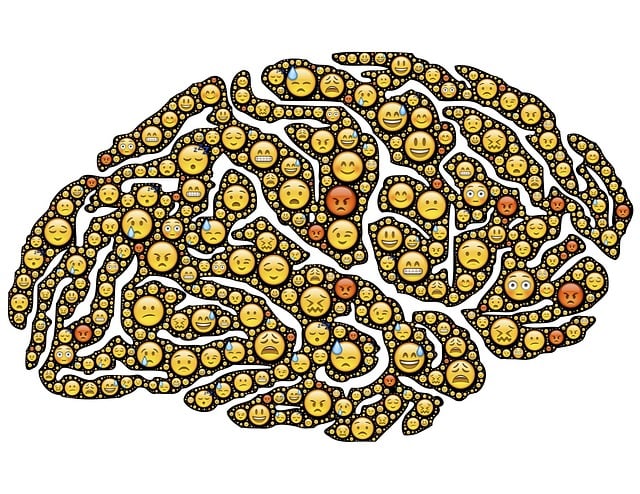Arvada Interpersonal Issues Therapy focuses on developing emotional intelligence (EI) through recognizing triggers, enhancing self-awareness, cultivating empathy, and improving communication. This approach equips individuals to manage emotions effectively, navigate social situations, build stronger connections, and resolve conflicts. By integrating mindfulness, introspection, active listening, and empathy-building techniques, Arvada Interpersonal Issues Therapy promotes mental wellness, fosters empathetic communities, and strengthens relationships in various contexts, including healthcare.
Emotional intelligence (EQ) is a powerful tool for personal growth and healthy relationships. In this comprehensive guide, we explore essential aspects of building EQ from the perspective of Arvada Interpersonal Issues Therapy. From understanding emotional triggers and enhancing self-awareness to cultivating empathy and refining communication skills, each section equips readers with practical strategies. Discover how these techniques can transform your interactions and foster deeper connections in personal and professional settings, all backed by the expertise of Arvada Interpersonal Issues Therapy.
- Understanding Emotional Intelligence: The Arvada Interpersonal Issues Therapy Perspective
- Identifying Your Emotional Triggers and Patterns
- Enhancing Self-Awareness: A Key Component of EQ Development
- Building Empathy: Walking in Others' Shoes for Deeper Connections
- Effective Communication Strategies for Better Relationships
Understanding Emotional Intelligence: The Arvada Interpersonal Issues Therapy Perspective

Emotional intelligence (EI) is a multifaceted construct that involves recognizing, understanding, and managing one’s own emotions while also empathizing with others. From the perspective of Arvada Interpersonal Issues Therapy, EI development is seen as an essential component of overall well-being and healthy relationships. This therapeutic approach emphasizes the interconnectedness between emotional awareness and interpersonal functioning.
The therapy highlights that cultivating EI involves not just identifying feelings but also learning effective conflict resolution techniques and practicing mindfulness meditation to enhance empathy and compassion. By integrating these strategies, individuals can improve their ability to navigate complex social situations, build stronger connections, and manage stress effectively. Moreover, Arvada Interpersonal Issues Therapy underscores the importance of risk assessment for mental health professionals to ensure they have the necessary tools to support clients in developing emotional intelligence while maintaining professional boundaries.
Identifying Your Emotional Triggers and Patterns

Identifying your emotional triggers and patterns is a pivotal step in enhancing your emotional intelligence. Through Arvada interpersonal issues therapy, individuals can uncover the root causes of their emotional responses. This introspective process involves recognizing situations or interactions that consistently evoke strong feelings. By keeping a journal to track these moments, one can identify recurring themes and triggers. For instance, certain workplace dynamics might prompt feelings of anger or anxiety, while personal relationships could stir up emotions like sadness or guilt.
Understanding these patterns is the first step towards managing them effectively. It encourages individuals to adopt self-care practices and mental wellness strategies, such as mindfulness exercises, to cultivate emotional resilience. This heightened awareness, fostered through increased Mental Health Awareness, enables people to respond thoughtfully rather than reacting impulsively to their emotions.
Enhancing Self-Awareness: A Key Component of EQ Development

Enhancing self-awareness is a cornerstone in developing emotional intelligence (EQ). It involves recognizing and understanding your emotions, strengths, weaknesses, and how they impact your thoughts and actions. Through introspective practices, individuals can better navigate their internal experiences, leading to more effective communication with others. This heightened awareness fosters healthier relationships by promoting empathy, compassion, and constructive conflict resolution, all of which are essential aspects of successful interpersonal interactions, as emphasized in Arvada Interpersonal Issues Therapy.
In the context of emotional healing processes, self-awareness plays a pivotal role in burnout prevention strategies for healthcare providers. By acknowledging their emotional states, professionals can implement effective coping mechanisms, ensuring they remain attuned to patients’ needs without sacrificing their well-being. Moreover, raising public awareness campaigns development around EQ and its benefits can contribute to broader societal improvements by fostering more supportive and empathetic communities.
Building Empathy: Walking in Others' Shoes for Deeper Connections

Building empathy is a powerful tool for fostering deeper connections and navigating interpersonal issues, as highlighted by Arvada Interpersonal Issues Therapy. It involves stepping into another person’s shoes to understand their feelings, perspectives, and experiences. This ability to put yourself in someone else’s position strengthens relationships, whether it’s with friends, family, or colleagues. By practicing empathy, you can create a supportive environment where individuals feel heard, validated, and understood, ultimately enhancing mental wellness.
Empathy building strategies encourage active listening, non-judgmental attitudes, and the ability to recognize and reflect on others’ emotions. This process not only strengthens bonds but also promotes resilience in both the giver and receiver of empathy. It allows for better conflict resolution, enhanced communication, and improved overall emotional intelligence, which is crucial for managing and understanding one’s own feelings as well as those of others.
Effective Communication Strategies for Better Relationships

Effective communication is a cornerstone of building strong relationships and addressing interpersonal issues, as highlighted by Arvada Interpersonal Issues Therapy. It involves more than just exchanging words; it entails actively listening, understanding, and responding to others’ emotions and perspectives. One key strategy is to practice empathy—the ability to step into someone else’s shoes and see the world from their viewpoint. Empathy building strategies foster deeper connections by allowing individuals to express themselves openly and feel heard and understood.
Healthcare providers play a pivotal role in promoting effective communication through Cultural Competency Training, which equips them with skills to navigate diverse backgrounds and perspectives. Mental Health Education Programs Design also contribute by teaching both professionals and clients the importance of clear, respectful, and compassionate communication. These initiatives ensure that interpersonal interactions are not just functional but foster emotional intimacy and understanding, ultimately strengthening relationships.
Emotional intelligence, as seen through the lens of Arvada Interpersonal Issues Therapy, is a multifaceted skill set that enriches personal and professional relationships. By understanding emotional triggers, enhancing self-awareness, building empathy, and employing effective communication strategies, individuals can navigate life’s complexities with greater ease. These practices not only foster deeper connections but also empower individuals to lead more fulfilling lives. Incorporating these techniques into daily routines can significantly improve overall well-being and satisfaction.














